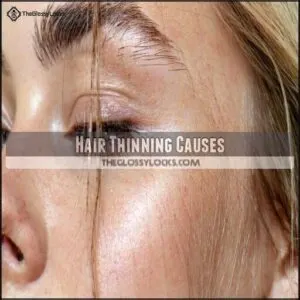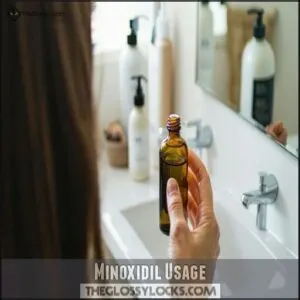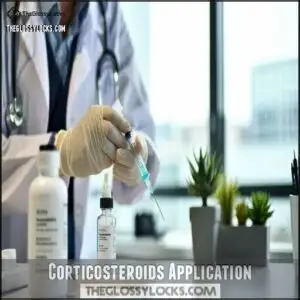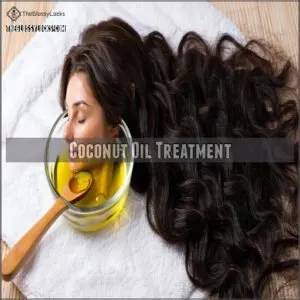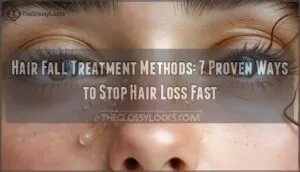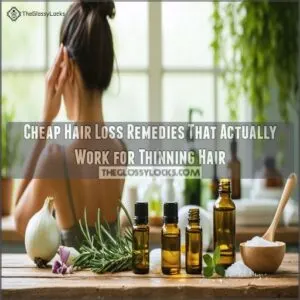This site is supported by our readers. We may earn a commission, at no cost to you, if you purchase through links.
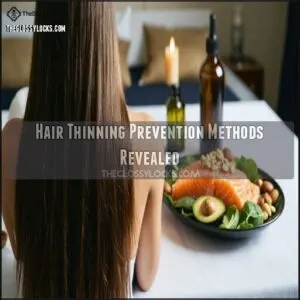
Start with the basics: a protein-rich diet packed with biotin, iron, and omega-3s keeps your locks strong from the inside out.
For medical solutions, minoxidil and finasteride are proven treatments that can help stop hair loss in its tracks.
Don’t forget about stress management – your hair’s health is tied to your overall wellbeing.
Gentle hair care practices and avoiding tight hairstyles can make a big difference too.
The science behind hair growth has come a long way, with breakthrough treatments like PRP showing promising results.
Table Of Contents
- Key Takeaways
- Hair Thinning Causes
- Medical Treatments
- Nutritional Approaches
- Natural Prevention Methods
- Lifestyle Changes
- Frequently Asked Questions (FAQs)
- How can I stop my hair from thinning?
- What are the big 3 to prevent hair loss?
- Can hair thinning be reversed?
- Which vitamin deficiency causes hair loss?
- Can swimming pools damage hair and cause thinning?
- How does air pollution affect hair loss patterns?
- Does sleeping position impact hair thinning over time?
- Can certain medications interact with hair growth supplements?
- Do seasonal changes influence the rate of thinning?
- Conclusion
Key Takeaways
- You’ll need a multi-pronged approach combining medical treatments (like minoxidil and finasteride), proper nutrition, (especially biotin, iron, and omega-3s), and gentle hair care practices to effectively prevent hair thinning.
- You can boost your results with natural remedies like rosemary oil and saw palmetto, which studies show can be as effective as prescription medications for blocking DHT and stimulating hair growth.
- You should identify the root cause of your hair thinning – whether it’s androgenetic alopecia, telogen effluvium, hormone imbalances, or thyroid issues – as this will determine the most effective treatment strategy.
- You’ll get the best results by starting treatment early and staying consistent with your chosen methods, while avoiding harsh chemicals, tight hairstyles, and excessive heat styling that can damage your hair.
Hair Thinning Causes
You’re likely wondering what’s causing your hair to thin, and it’s important to understand that factors like genetics, hormones, and thyroid issues can contribute to hair thinning.
By identifying the underlying causes, such as androgenetic alopecia or telogen effluvium, you can take the first step to preventing further hair loss and promoting healthier hair growth.
Androgenetic Alopecia
You’re likely experiencing androgenetic alopecia, a common cause of hair loss.
It’s also known as male pattern baldness, leading to hair thinning prevention challenges.
Genetic testing can help, and treatments like finasteride or minoxidil may slow hair loss, promoting follicle health and addressing alopecia symptoms.
Telogen Effluvium
You’re experiencing telogen effluvium, a stress response causing hair shedding.
- Telogen triggers
- Hair cycling
- Effluvium treatment
- Stress response, for hair thinning prevention, and hair loss prevention, consider these factors to address thinning hair treatment and hair thinning causes.
Hormone Imbalances
You can prevent hormonal hair loss by addressing hormone imbalances.
Hormone testing helps identify issues like menopause symptoms or PCOS treatment needs, affecting thyroid function and estrogen levels.
Leading to androgenetic alopecia, so consider hormone changes for hair loss prevention.
Genetic Factors
You may inherit genetic hair loss.
Consider genetic testing to understand your family history and hair patterns.
Genetic predisposition plays a role in male and female pattern hair loss, so knowing your inheritance factors can help with hair loss prevention strategies.
- Genetic testing
- Family history
- Hair patterns
- Inheritance factors
- Genetic predisposition
Thyroid Imbalances
You can prevent hair thinning by managing thyroid problems.
The following table outlines the relationship between thyroid tests, hormone levels, and the role of iodine:
| Thyroid Tests | Hormone Levels | Iodine Role |
|---|---|---|
| Blood work | T3, T4 | Nutrient |
| Ultrasound | TSH | Thyroid function |
| Biopsy | Free T4 | Hormone production |
| Scan | Thyroid antibodies | Hypothyroidism symptoms |
| Exam | Thyroid medication | Hair loss causes |
This information can help identify and address hair loss causes related to thyroid issues.
Medical Treatments
You can explore medical treatments to prevent hair thinning, including medications like minoxidil and finasteride.
These treatments can help stimulate hair growth, slow down hair loss, and even promote regrowth, so it’s worth discussing them with your doctor to see if they’re right for you.
Minoxidil Usage
You can use minoxidil, also known as Rogaine, to treat thinning hair.
Apply it directly, following dosage guidelines, to promote hair growth and prevent hair thinning, with expected results in a few months, and be aware of possible side effects during treatment duration.
Several lifestyle habits can contribute to thinning hair problems.
Finasteride Effects
Taking Finasteride, known as Propecia, reduces DHT, promoting hair regrowth for male-pattern hair loss.
It may cause sexual side effects, impacting prostate health.
Long-term impacts vary, so discuss risks with your doctor to determine if Finasteride is right for you as a hair loss treatment.
Additionally, maintaining a healthy lifestyle through proper hair care routines can also support hair health.
Corticosteroids Application
You can try corticosteroid injections or creams to reduce inflammation.
- Corticosteroid Injections reduce swelling
- Steroid Side Effects occur sometimes
- Hair Regrowth is a goal
- Corticosteroid Creams are applied topically
- Steroid Therapy helps scalp health
Understanding hair loss treatment options is important for effective management, focusing on hair loss treatment and considering corticosteroid injections as a method to achieve hair regrowth.
Platelet-Rich Plasma Injections
Platelet-Rich Plasma (PRP) injections harness your body’s natural healing abilities to combat hair thinning.
During this innovative procedure, your own blood cells stimulate hair follicle regeneration and improved scalp health.
| PRP Therapy Aspect | Benefits | What to Expect |
|---|---|---|
| Treatment Process | Stimulates cell regeneration | 3-4 sessions recommended |
| Recovery Time | Minimal downtime | Some scalp tenderness |
| Results Timeline | Visible in 3-6 months | Maintenance treatments needed |
The treatment process involves a series of sessions, with minimal downtime, allowing for a quick recovery and return to daily activities.
Nutritional Approaches
You’ll find that what you eat directly impacts your hair’s health, with nutrients like biotin, iron, and omega-3s playing key roles in preventing thinning.
Your diet can be your strongest ally against hair loss, so focus on including protein-rich foods, leafy greens, nuts, and fish in your daily meals, which provide essential nutrients like omega-3s.
Biotin Rich Foods
Your plate holds the key to hair thinning prevention through biotin-rich foods.
Egg yolks deliver over one-third of your daily biotin needs in a single serving, supporting healthy hair growth.
For maximum biotin intake, prioritize these nutrient-rich options:
- Organ meats like liver (nature’s biotin powerhouse)
- Nuts and seeds, particularly almonds
- Salmon, which offers biotin plus hair-strengthening omega-3s.
Incorporating Biotin Rich Foods into your diet can have a significant impact on hair health.
Vitamin a Benefits
Your hair’s daily growth cycle depends heavily on vitamin A, a powerful antioxidant that helps produce healthy sebum for your scalp.
You’ll find this essential nutrient in sweet potatoes, carrots, and spinach.
When you’re getting enough vitamin A, it supports your hair follicles’ natural renewal process, prevents hair thinning, and maintains skin health.
Just don’t overdo it—excess vitamin A can actually trigger hair loss.
Omega-3 Fatty Acids Role
While vitamins play their part, omega-3 fatty acids pack a powerful punch for your hair’s health.
You’ll find these hair growth boosters in fish oil supplements and natural sources.
Here’s what omega-3s can do for your locks:
- Nourish hair follicles from within
- Reduce inflammation that may cause hair thinning
- Support scalp health by maintaining proper oil balance
- Strengthen hair strands to prevent breakage
Adding salmon, walnuts, or chia seeds to your meals gives your hair the fatty acid benefits it needs.
Iron Deficiency Prevention
Three essential strategies can help you prevent iron deficiency and maintain healthy hair growth.
Start with iron-rich foods like lean meat, salmon, and fortified breads.
You’ll boost absorption by pairing iron sources with vitamin C foods.
Consider daily iron supplements between meals if you’re at risk.
Regular screening helps catch deficiencies early, while strategic meal timing maximizes iron uptake for stronger hair.
Understanding hair growth factors is key for developing an effective prevention plan to address iron deficiency.
Balanced Diet Importance
Nourishing your body with a balanced diet can markedly impact your hair’s health.
You’ll want to focus on protein intake from lean meats and fish, while incorporating healthy fats from avocados and nuts.
The Mediterranean diet, rich in vitamins and minerals for hair loss prevention, provides ideal nutrient balance.
Smart meal planning helps maintain caloric control, ensuring you’re getting everything your hair needs through dietary changes.
Natural Prevention Methods
You’ll find several natural ways to fight hair thinning without harsh chemicals, including options like rosemary oil and regular scalp massages.
Natural treatments work with your body to strengthen hair follicles and improve blood flow to your scalp, helping you maintain thicker, healthier hair over time, which can be achieved through regular scalp massages.
Saw Palmetto Benefits
Recent studies reveal saw palmetto’s remarkable ability to fight hair loss through natural DHT blockade. This powerful herb acts like prescription medications but with fewer side effects.
For ideal thinning hair prevention, take 160-320mg daily. Using high quality Saw Palmetto Supplements is essential for effective treatment.
- Reduces scalp DHT levels by 27% according to 2022 research
- Shows significant hair regrowth in both men and women
- Combines well with other treatments for enhanced results
- Works through natural enzyme inhibition
- Achieves best results when started during early hair thinning
Rosemary Oil Effects
Looking for a powerful natural remedy?
Studies show that essential oil therapy using rosemary matches minoxidil’s effectiveness for androgenetic alopecia.
You’ll find this aromatic oil improves scalp health and stimulates hair regrowth through increased blood circulation.
For the best hair thinning prevention results, mix a few drops with your regular shampoo or combine with a carrier oil for direct application.
Scalp Massages Techniques
Gentle stimulation awakens your scalp’s potential. A daily 5-minute scalp massage boosts blood flow to your hair follicles, promoting healthier growth.
Incorporating essential oils for scalp massage can further enhance these benefits. Here’s what makes scalp massages effective:
- Use circular motions with your fingertips, applying firm but comfortable pressure
- Massage from your hairline to the nape of your neck, covering your entire scalp
- Practice before bedtime to combine hair care with relaxation techniques and improve your overall scalp health through a daily massage.
Essential Oils Usage
You can use essential oils like rosemary, lavender, and thyme to promote scalp health and reduce hair thinning.
Mix a few drops with carrier oils and apply through scalp massage, a natural hair loss remedy that improves scalp health and hair growth, a key tip for natural remedies.
Coconut Oil Treatment
While essential oils work their magic, coconut oil’s natural fats can be your hair’s best friend.
This tropical treasure helps repair protein loss in damaged strands and protects against harmful UV rays.
You’ll want to warm the oil slightly, then massage it into your scalp for 5-10 minutes.
For best results, leave it overnight and shampoo in the morning – your hair will thank you, and the tropical treasure will have done its job, providing a great way to repair and protect your hair with natural fats.
Lifestyle Changes
You’ll find that small changes in your daily routine, from using gentle hair care products to managing stress levels, can make a big difference in preventing hair loss.
By taking action early and avoiding harsh treatments like tight hairstyles and chemical processes, you’re giving your hair the best chance to stay healthy and strong.
Gentle Hair Care
Beyond natural remedies, your daily hair care routine plays a huge role in preventing thinning.
Taking care of your strands doesn’t need to be complicated – it’s all about being kind to your hair. You’ll want to adopt these proven shampoo techniques and gentle styling habits that protect your delicate strands.
- Use lukewarm water and sulfate-free shampoo, working from roots to tips
- Brush with a wide-toothed comb while hair is damp, starting from the ends
- Pat hair gently with a microfiber towel instead of rough rubbing
- Wrap wet hair in a soft cotton t-shirt to absorb moisture without friction
Stress Management
During times of emotional distress, your hair can take a hit.
Try incorporating meditation techniques and mindfulness exercises into your daily routine – even five minutes can make a difference.
Yoga benefits both your mind and follicles, while deep breathing exercises help reduce cortisol levels that contribute to hair loss.
Simple relaxation methods, like a gentle scalp massage, can ease stress and promote healthier hair growth.
Hydration Importance
Managing your water intake directly impacts your hair’s health.
Adequate water intake supports growth and prevents brittle hair.
While you’re working on stress relief, don’t forget that proper hydration keeps your hair strands strong and flexible.
You’ll want to aim for 8 glasses of water daily, plus hydrating foods like cucumbers and watermelon to maintain fluid balance.
Your drinking habits affect your scalp’s moisture levels, which in turn supports healthy hair growth and reduces thinning.
Avoiding Harsh Treatments
Your hair’s health takes a hit when you expose it to harsh chemical treatments and excessive styling.
To protect your precious strands from thinning, consider these gentler alternatives:
- Skip frequent hair dye sessions and opt for semi-permanent colors or natural highlighting techniques
- Replace heat styling with heatless curling methods using soft foam rollers or braiding
- Avoid chemical peels, relaxers, and perm treatments that can weaken your hair structure
By following these tips, you can help maintain the health and integrity of your hair, preventing damage from harsh chemical treatments and excessive styling.
Early Intervention Significance
While you’re taking steps to protect your locks, don’t wait until you notice significant thinning to act.
Early detection of hair loss gives you the best chance at preserving your hair.
You’ll want to watch for early signs like increased shedding in your brush or shower drain.
By starting prevention methods and timely treatment right away, you’ll have more options to stop hair loss and maintain healthy growth.
Frequently Asked Questions (FAQs)
How can I stop my hair from thinning?
You won’t believe how simple it’s to rescue your thinning locks.
Start with minoxidil treatment, maintain a nutrient-rich diet, avoid tight hairstyles, and try scalp massage.
Don’t forget to consult your doctor.
What are the big 3 to prevent hair loss?
The proven "big three" treatments include Finasteride (Propecia) to block DHT hormones, Minoxidil (Rogaine) to stimulate growth, and ketoconazole shampoo to reduce scalp inflammation and support healthy follicles.
Can hair thinning be reversed?
You can reverse thinning with FDA-approved treatments like minoxidil and finasteride.
Early intervention works best, but you’ll need consistent treatment.
Natural remedies and proper nutrition may also help slow the process.
Which vitamin deficiency causes hair loss?
Your hair loss might stem from deficiencies in vitamins A, B (especially B12), C, D, and E.
You’ll also want to watch your iron, zinc, and selenium levels.
Check with your doctor for proper testing.
Can swimming pools damage hair and cause thinning?
Yes, chlorine and other pool chemicals can weaken your hair’s structure, leading to breakage and thinning.
You’ll want to wear a swim cap and rinse thoroughly with clean water after swimming.
How does air pollution affect hair loss patterns?
You’re exposed to air pollution, which can damage your hair follicles, leading to hair loss, so reducing exposure is key to minimizing its negative effects on your hair.
Does sleeping position impact hair thinning over time?
While you’re resting, constant pressure on the same spots of your scalp can stress follicles and cause breakage.
Try switching positions regularly and using silk pillowcases to reduce friction during sleep.
Can certain medications interact with hair growth supplements?
Before starting supplements, you’ll want to check with your doctor.
Since blood thinners, thyroid medications, and antidepressants can interact with biotin and other hair growth supplements, affecting their effectiveness or causing side effects.
Do seasonal changes influence the rate of thinning?
Your hair’s shedding cycle can skyrocket during seasonal shifts.
You’ll typically notice more hair loss in early fall and late spring, though it’s temporary.
Don’t worry – your hair will naturally bounce back.
Conclusion
Rome wasn’t built in a day, and neither is a healthy head of hair.
By exploring these hair thinning prevention methods, you’re taking control of your hair’s future.
Whether you choose medical treatments, natural remedies, or lifestyle changes, consistency is key.
Remember that what works for one person may not work for another, so don’t be afraid to try different approaches.
With the right combination of treatments and patience, you can maintain and protect your precious locks.
- https://www.healthline.com/health/thinning-hair
- https://my.clevelandclinic.org/health/diseases/21753-hair-loss
- https://azcdps.com/2024/08/05/10-effective-ways-to-prevent-hair-loss-tips-for-healthy-and-strong-hair/
- https://www.medicalnewstoday.com/articles/325307
- https://www.health.harvard.edu/diseases-and-conditions/its-not-too-late-to-save-thinning-hair

